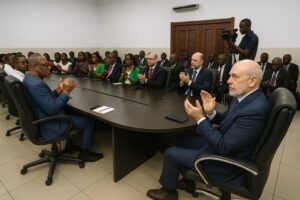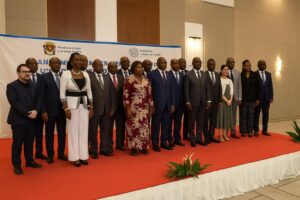Strike Notice Clouds New Academic Year
Only days before students file back onto the central campus in Brazzaville, the inter-union college representing lecturers, researchers and support staff has delivered a four-day strike notice, citing unpaid wages and social deductions. The action could begin on the very morning scheduled for registration.
The decision was hammered out during a packed general assembly on Friday 3 October at Bayardelle, headquarters of the Higher Education Teachers’ Union. After three hours of debate and vote counting, delegates opted for what they call a “warning movement” designed to speed up talks with authorities.
Key Financial Claims Put Forward
Unions maintain that five months of salary arrears covering August–September 2024 and July–September 2025 remain outstanding, despite a protocol signed late last year. They also point to overtime and practical-class allowances accumulated since 2018, plus employer contributions that, they say, never reached social-security accounts.
Speaking after the vote, Dr. Jean-Pierre Massamba, spokesperson for the inter-union college, stressed that the platform “seeks respect for commitments, nothing more, nothing less.” He praised members for remaining, in his words, “calm and disciplined while facing very real household pressures.”
Government Seeks ‘Responsible Compromise’
Contacted by phone, an adviser to the Minister of Higher Education affirmed that “dialogue channels remain open” and that a technical committee is already verifying payroll figures with the Treasury. “We understand the concerns, but we must preserve the academic calendar,” the adviser underlined.
Officials also point to the 2022 wage catch-up, financed after petroleum revenues improved, as evidence of their good faith. Budget officers, however, acknowledge a temporary cash-flow crunch linked to recent rehabilitation works on campuses in Brazzaville, Pointe-Noire and the new Dolisie extension.
Students Fear Disruption of Courses
For thousands of first-year entrants, the standoff stirs anxiety. “My parents already paid for a room near campus; if classes stop, that money is lost,” sighs Marlène Ibata, 19, who arrived from Ouesso to study geology. She hopes lectures can start as scheduled.
Student associations plan a peaceful march next week to urge both sides to reach consensus. “Our education should not be a bargaining chip,” declares Serge Nkaya, president of the General Union of Congolese Students, adding that any prolonged shutdown would delay scholarships abroad.
Economic Backdrop Influences Campus Tensions
Analysts link the salary backlog to wider fiscal pressures. After the global health crisis, Congo-Brazzaville faced reduced oil output and volatile prices, while simultaneously investing in roads and energy grids. Public-sector wage payments, usually 39% of expenditure, have occasionally slipped behind treasury inflows.
Dr. Hortense Mombouli, senior economist at CERAPE, notes that universities are particularly exposed. “Their payroll is monthly yet revenue transfers are quarterly. When a quarter’s tranche is late, arrears pile up fast.” She suggests ring-fenced funds dedicated to higher education salaries.
University Management Caught in the Middle
Rectorate sources confirm they forwarded payroll files on time and have started an internal audit of extra-hour claims. The process includes digital attendance sheets, a novelty aimed at reducing disputes about who taught which session, how long, and where.
Prof. Rosalie Oba, vice-chancellor in charge of academics, explains that management “shares the frustration but must also safeguard the university’s credibility.” She insists final-year dissertations will still be defended in November, even if the first week of classes is disrupted.
Voices from the City
Around the campus perimeter, photocopy stalls and cafeterias depend on student traffic. “When the gates stay shut, our earnings drop by half,” laments Aimé Mouanda, who sells course packets near the science faculty. Vendors therefore watch negotiations with almost as much interest as scholars.
Traffic operators fear a sudden surge on public buses if the strike lifts without notice, prompting the municipal transport directorate to draft a flexible schedule. “We prefer clarity; a stop-and-go rhythm is costly for maintenance,” remarks an official at STPU.
Looking Ahead to Possible Solutions
Both sides have until 10 October to settle before the walkout legally begins. Mediators from the National Commission for Social Dialogue, who brokered a deal in 2022, have already solicited working documents and scheduled a joint session for Monday.
Observers insist that timely resolution is in everyone’s interest. Prolonged closures could cause students to overrun into the next fiscal year, complicating budget cycles. A mutually accepted calendar, paired with phased payments, is increasingly viewed as the pragmatic path forward.
In similar circumstances last spring, the government released a special tranche after universities provided transparent headcounts. Policy observers say that precedent could reappear if current audits confirm figures. Unions, for their part, promise “flexibility on timelines” once a written schedule is communicated.
For now, freshmen keep buying notebooks, lecturers polish course outlines and administrators prepare time-tables, all hoping the strike notice remains only a notice. The next few days will show whether classrooms fill with voices or stay silent under the October sun.






















